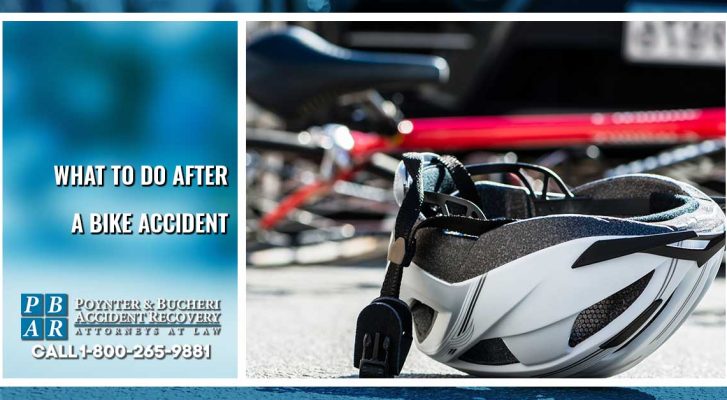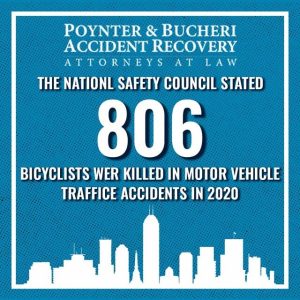
What to Do After a Bike Accident

Biking offers a healthy and eco-friendly alternative to driving, but, tragically, many cyclists suffer from serious or even fatal injuries every year. Although some of these individuals were injured due to serious bicycle falls, numerous others were struck by vehicles.

The National Safety Council stated that 806 bicyclists were killed in motor vehicle traffic accidents in 2020 alone and that preventable cyclist deaths have increased by 44% in the last decade. Although shocking, these statistics don’t even account for the many others who have suffered from serious and disabling bicycle accident injuries due to negligent drivers.
If you’ve suffered from a crashed bicycle accident, you need to know what steps to take to ensure your safety and how to build an unshakable accident claim. Fortunately, the Poynter & Bucheri team is here to teach you what to do after a bike accident.
Don’t Say Anything That Could Be Used Against You
Whether you’ve fallen off your bike due to a driver’s negligence or suffered from a collision, it’s crucial to remember that your claim will likely be against someone else involved in the crash. Anything that you say after the accident can be used against you to weaken your case.
If physically able, you will need to communicate with others involved in the accident to exchange contact and insurance information, but avoid discussing the situation with them further.
You should especially avoid apologizing, as even a polite “sorry” can be used against you and weaken your claim. Sadly, even expressing concern over a negligent driver’s injuries can be misinterpreted as admitting fault.
Additionally, never accept payment from another person involved in the accident. They may offer you money and ask you to not contact the police. But if you accept this payment, the driver may later claim the accident was your fault.
Contact Emergency Services or the Police
You need to contact emergency services if anyone was injured in the accident. If no one sustained serious injuries, you should still report the accident to the police and wait for them to arrive. The police’s accident report can serve as crucial evidence for your claim, and you’re also legally obligated to call road authorities if anyone was injured or if vehicle damages surpassed $1,000.
When the police arrive, answer all of their questions truthfully, and report your known injuries. Don’t provide additional information to the responding officers unless they request it. Again, anything you say at the scene of the accident can be used against you and provide the other party with proof of liability.
Receive Medical Attention at the Scene of the Accident
If paramedics arrive at the scene and want to treat your wounds, accept their help and allow them to take you to the hospital if necessary. You may have sustained more serious injuries than you realize, and you could have suffered from delayed onset injuries that won’t become apparent until later.
Depending on the severity of your injuries, the paramedics may not take you to the hospital, but it’s important to seek medical attention nonetheless. You may not yet know the full extent of your injuries, and if you delay, you’ll have a harder time recovering compensation for medical bills and related expenses.
Gather as Much Evidence as Possible
You need to gather ample evidence that supports your claim that the other party was at fault for the accident and that you sustained damages as a direct result. Some examples of valuable evidence that can prove the other person was at fault include:
- Eyewitness statements: If anyone saw the accident occur, they can corroborate that the negligent party was responsible.
- Photographic and video evidence: Pictures and videos of the collision and its aftermath can provide invaluable evidence for proving that a driver was liable.
- The police’s accident report: The officers who responded to the scene will prepare an accident report that includes the details of the accident, witness statements, and descriptions of the weather and road conditions.
- Traffic violations: If the driver broke a law at the time of the accident, such as running a stop sign or failing to yield, you can use the violation as evidence.
- Physical evidence: Debris, skid marks, and other physical evidence at the scene could provide convincing evidence corroborating your claim.
- Accident reconstruction expert testimony: An accident reconstruction expert can recreate the scene of a crash with diagrams to provide further evidence that the other party was at fault.
You’ll also need to provide solid evidence that you sustained damages, which may include medical bills, property damage, lost wages, loss of enjoyment of life, pain and suffering, and loss of future earnings. Make sure to gather all available forms of evidence, which may include:
- Medical records: Medical bills, prescriptions, doctor’s reports, and any other medical documents can show the extent of your injuries.
- Expert medical testimony: A qualified medical expert can provide statements regarding the severity of your injuries and how they may impact your ability to work and enjoy life.
- Psychological evaluations: If the accident and your injuries have taken a toll on your mental and emotional health, you can have a mental health professional provide a statement regarding your well-being. Emotional trauma and mental health challenges fall under pain and suffering damages.
- Work records or a letter from your employer: If you had to miss work as a direct result of your injuries, you can provide documentation or a letter from your employer corroborating that your injuries hurt your earnings.
Gathering as much evidence as possible will strengthen your case and increase your chances of receiving fair compensation.
Contact a Bicycle Accident Attorney
Handling a claim on your own can be incredibly challenging, and you can greatly increase your likelihood of recovering the money you deserve by enlisting the help of a bicycle accident attorney. An attorney can handle all communication with the at-fault party as well as their insurance company and legal representation.
Remember, the negligent party’s insurance company will do anything to devalue your claim to save money. They want you to slip up and say or do something that they can use against you to deny liability. For that reason, it’s critical to have an attorney help you navigate the claims process.
For bicycle accident attorneys in Indianapolis, contact Poynter & Bucheri Accident Recovery Attorneys at Law. We have years of experience helping cyclists, and we’re ready to take on your case to hold the negligent party financially responsible for your injuries. Call us today at 1-800-265-9881, or you schedule a free case review online here.
